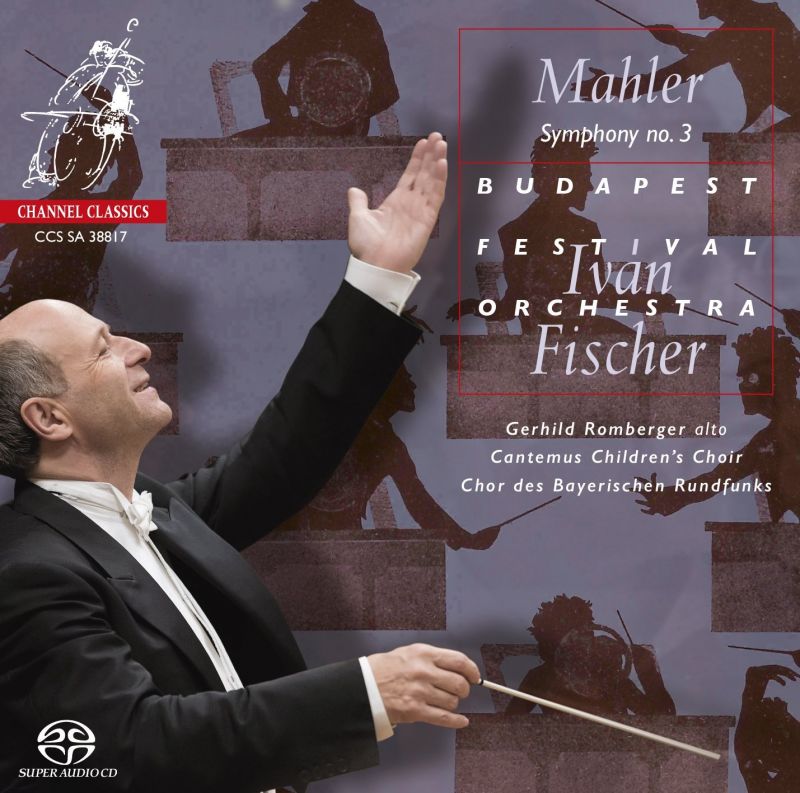MAHLER Symphony No 3 (Fischer)
View record and artist detailsRecord and Artist Details
Composer or Director: Iván Fischer, Gustav Mahler
Genre:
Orchestral
Label: Channel Classics
Magazine Review Date: 06/2017
Media Format: Super Audio CD
Media Runtime: 96
Mastering:
DDD
Catalogue Number: CCSSA38817

Tracks:
| Composition | Artist Credit |
|---|---|
| Symphony No. 3 |
Gustav Mahler, Composer
Bavarian Radio Chorus Budapest Festival Orchestra Cantemus Children’s Choir Gerhild Romberger, Contralto (Female alto) Gustav Mahler, Composer Iván Fischer, Composer |
Author: David Gutman
Here for once is a Mahler symphony release that feels different from the outset. Jared Sacks and his colleagues at Channel Classics are famous for setting high technical standards and they surpass their previous efforts here. I doubt whether there has ever been a more precisely focused, more sheerly beautiful recording of any Mahler work. There is perhaps a downside. The sound, like Iván Fischer’s interpretation, avoids hard edges and apocalyptic excess, leading to a certain loss of peripheral vision. Deryck Cooke once described the first movement of the Third as ‘the most original and flabbergasting thing Mahler ever conceived’. But how vulgar ought it to sound? Reluctant to parade its roughest edges and disinclined to hurry, Fischer instead elicits a range of pristine, jewel-like colour that leaves its fabric refreshed.
While the consensual yet individualistic grain of Fischer’s music-making presents parallels with Claudio Abbado’s late work in Lucerne, his rubato is more insistent: Leonard Bernstein without the angst. His finale can boast neither the instantaneous rapture of the former nor the self-conscious solemnity of the latter, in spite of which the argument is transformed, lightened, some will say liberated in his hands. Those who feel that Mahler miscalculated the insistent grandeur of his endings will appreciate the way Fischer, like Abbado, makes the texture less brazen at the close, muffling the timpani into the bargain. Those who do not may also resist the manner in which Fischer defangs the sweatier, more demotic episodes of the first movement despite a sometimes breathtaking variety of affect.
The rural idyll is most potent and incontrovertibly ‘right’ in the inner movements, all maximally transparent. Difficult to imagine the avowedly summery third and its distanced solos being bettered any time soon. If Gerhild Romberger seems rather forwardly balanced in the Friedrich Nietzsche setting, her robust delivery is presumably meant to fit with the outdoors quality of the rest. She also has to contend with the slurred cries of the night-bird as suggested by the woodwind’s hinaufziehen (‘pull up’) markings. After that the choral contributions maintain an exalted standard without sounding overly genteel.
Why nitpick? You’d have to be hypercritical indeed not to rejoice in the appearance of a studio recording made the old-fashioned way with exquisite care, multiple takes and not a trace of routine in the playing. The only disappointment is that there can’t be much Mahler left to come from this source. The Eighth would seem to be incompatible with both the conductor’s angle on the composer and the economic constraints under which his orchestra must operate. He has not, as far as I know, tackled Cooke’s performing version of the Tenth. This Third is a must-have.Discover the world's largest classical music catalogue with Presto Music.

Gramophone Digital Club
- Digital Edition
- Digital Archive
- Reviews Database
- Full website access
From £8.75 / month
Subscribe
Gramophone Full Club
- Print Edition
- Digital Edition
- Digital Archive
- Reviews Database
- Full website access
From £11.00 / month
Subscribe
If you are a library, university or other organisation that would be interested in an institutional subscription to Gramophone please click here for further information.




